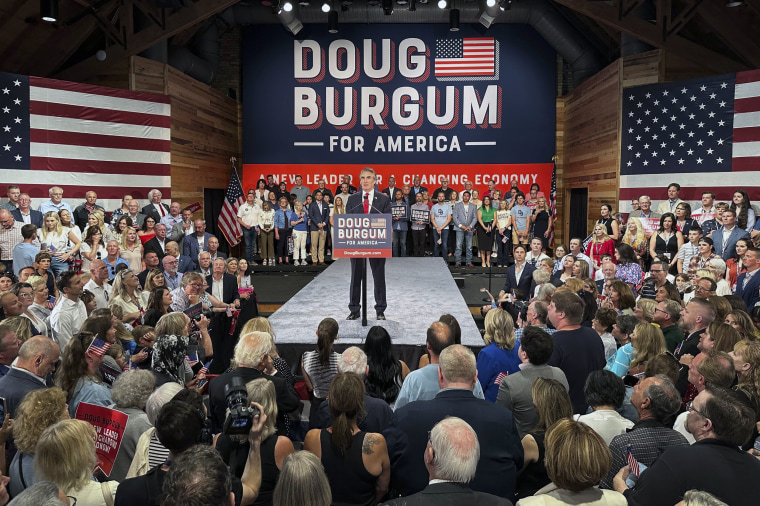North Dakota Republican Gov. Doug Burgum is jumping into the Republican presidential nominating fight with little national name recognition — but with deep pockets that could change that.
Burgum, a multimillionaire who made his riches in the software industry, told NBC News' Henry Gomez last month that he's prepared to dip into his own personal wealth for his presidential bid.
Depending on how much he sinks into his bid, he'll join a long list of presidential hopefuls who have spent millions of their own money seeking the White House. Many ended their campaigns with nothing to show for it — but three major party nominees in the last two decades were notable self-funders.
Here's a look at how these candidates have fared, and who else is spending big money now:
2024
Businessman Vivek Ramaswamy is the largest self-funder so far, having loaned his campaign $10.25 million of the approximately $11.5 million he raised through the end of March, which is the last time he had to disclose the state of his campaign finances. Perry Johnson, the Michigan businessman and author who is also running for president, has given his campaign $3.4 million.
Ramaswamy's initial investment appears to have paid off in at least one important way: Despite entering the field as a relative unknown, one of his top campaign strategists tweeted that he had already hit the unique donor requirement needed to help him qualify for the first Republican presidential debate.
2020
Last presidential election cycle was a banner year for self-funders, featuring three major candidates who all fell short of the Democratic Party's nomination.
Businessman and former New York City Mayor Michael Bloomberg upended the political environment by sinking $1.1 billion on his bid, according to Federal Election Commission filings. Environmental activist and hedge fund manager Tom Steyer spent almost $320 million of his own money on his campaign. And former Maryland Democratic Rep. John Delaney dropped $25 million on his unsuccessful campaign.
Delaney, despite being the first notable candidate to launch his presidential bid all the way back in 2017, dropped out before Iowa. Steyer lasted through the first four early states but dropped out without winning a delegate. And while Bloomberg made a bit of a splash ahead of Super Tuesday, all that money only netted him a few dozen delegates in the contest.
2016
The major self-funder in the 2016 election turned out to be the winner, Donald Trump. He loaned his campaign $66 million, a major amount of money, but he also relied in no small part on donor dollars too, especially during the general election.
2012
Republican Mitt Romney built a fortune through his career in business, but the former Massachusetts governor didn't lean on it in his 2012 presidential run. (More on his 2008 campaign below.)
The 2012 GOP primary had another wealthy businessman in it too: former Utah Gov. John Huntsman, who loaned his unsuccessful campaign more than $5 million.
2008
Romney loaned his campaign a significant amount of money — the election cycle before he won the GOP presidential nomination. In 2008, Romney gifted his campaign more than $44 million, but that wasn't enough to catch then-Arizona Sen. John McCain.
2004
This year, a Democrat had success filling their own campaign coffers with cash — then-Massachusetts Sen. John Kerry, who loaned his campaign more than $6 million ahead of the Iowa caucuses before storming to the Democratic nomination. He ultimately lost to incumbent President George W. Bush in the general election.
2000
Businessman Steve Forbes kicked off the new millennium with a bang, a largely self-funded bid to which he gave his campaign $76 million — about $38 million paying off a candidate loan he made to fund his 1996 campaign, plus another $38 million to fund his second run in 2000. Trumpeting a flat tax, the head of "Forbes" magazine never caught significant traction and he ultimately didn't make it far into the primaries.

